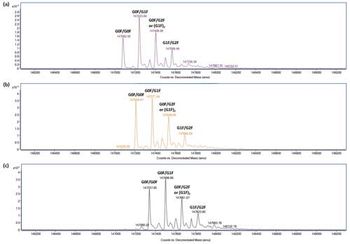
LCGC North America
While immunoassay (EIA) is a prevalent screening technique it is also prone to issues such as high false positive rates because of lack of analyte specificity. Mass spectrometry was therefore investigated as an alternative screening technique for the ability to improve analyte specificity on a comparable time scale. In this study, a rapid online sample preparation and injection method was developed using a commercially available guard cartridge on a conventional LC–MS-MS system. Using a two-point calibration curve to provide semi-quantitation, a robust method was developed and validated that improved upon the high false positive rate observed in immunoassay screening.





